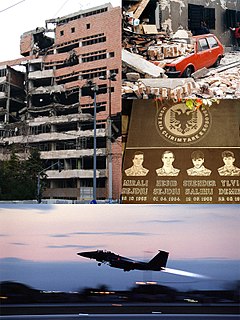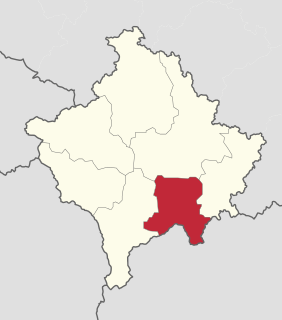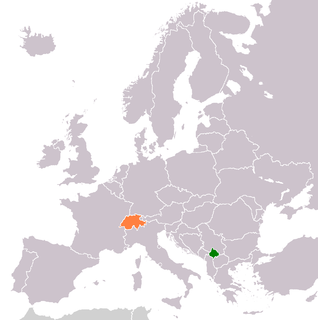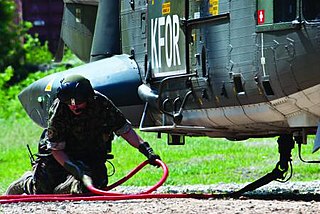
The Kosovo War was an armed conflict in Kosovo that started in late February 1998 and lasted until 11 June 1999. It was fought by the forces of the Federal Republic of Yugoslavia, which controlled Kosovo before the war, and the Kosovo Albanian rebel group known as the Kosovo Liberation Army (KLA), with air support from the North Atlantic Treaty Organisation (NATO) from 24 March 1999, and ground support from the Albanian army.

The Kosovo Liberation Army was an ethnic-Albanian separatist militia that sought the separation of Kosovo from the Federal Republic of Yugoslavia (FRY) and Serbia during the 1990s and the eventual creation of Greater Albania due to the presence of a vast ethnic majority of Albanians in the region, stressing Albanian culture, ethnicity and nation.

The International Security Assistance Force (ISAF) was a NATO-led military mission in Afghanistan, established by the United Nations Security Council in December 2001 by Resolution 1386, as envisaged by the Bonn Agreement. Its main purpose was to train the Afghan National Security Forces (ANSF) and assist Afghanistan in rebuilding key government institutions, but was also engaged in the War in Afghanistan (2001–14) against the Taliban insurgency.

The NATO bombing of Yugoslavia was the North Atlantic Treaty Organisation's (NATO) military operation against the Federal Republic of Yugoslavia during the Kosovo War. The air strikes lasted from March 24, 1999 to June 10, 1999. The bombings continued until an agreement was reached that led to the withdrawal of Yugoslav armed forces from Kosovo, and the establishment of the United Nations Interim Administration Mission in Kosovo, a UN peacekeeping mission in Kosovo. The official NATO operation code name was "Operation Allied Force" whereas the United States called it "Operation Noble Anvil"; in Yugoslavia the operation was incorrectly called "Merciful Angel" as a result of a misunderstanding or mistranslation.

The European Corps (Eurocorps) is an intergovernmental military corps with its headquarters of approximately 1,000 soldiers stationed in Strasbourg, Alsace, France. The corps had its headquarters established in May 1992, activated in October 1993 and declared operational in 1995. The nucleus of the force is the Franco-German Brigade established in 1987. The Treaty of Strasbourg, signed in 2004, gave the corps its formal legal basis when it entered into force on 26 February 2009.

The Kosovo Force (KFOR) is a NATO-led international peacekeeping force in Kosovo. Its operations are gradually reducing until Kosovo's Security Force, established in 2009, becomes self sufficient.

Camp Bondsteel is the main base of the United States Army under KFOR command in Kosovo. Located near Ferizaj in the eastern part of Kosovo, the base serves as the NATO headquarters for KFOR's Multinational Battle Group East (MNBG-E). The base is named after Vietnam War Medal of Honor recipient United States Army Staff Sergeant James L. Bondsteel.

The District of Ferizaj or District of Uroševac is one of the seven districts of Kosovo, with its seat in Ferizaj.

Suhareka, or Therandë or Suva Reka, is a town and municipality located in the Prizren district of central-southern Kosovo. According to the 2011 census, the town has 10,422 inhabitants, while the municipality has 59,722 inhabitants. The municipality is mainly habited by Albanians and has a small number of Roma people.

Camp Monteith was a military base in Gjilan, Kosovo, about 20 miles (32 km) east of Camp Bondsteel. A former Serb artillery outpost and 79 parcels of private land, the area was taken over by U.S. Marines and used as a base of operation during the Kosovo War of 1999. The camp was named after Jimmie W. Monteith, who received the Medal of Honor for heroism in France during World War II. At its peak, the camp housed 2000 soldiers and civilian contractors. Established in June 1999 to be used as a staging point for the bulk of US forces stationed in the Multi National Brigade-East. Initially occupied by U.S. Marines, over the past seven years successive rotations of U.S. Army forces have used the camp as part of NATO’s KFOR.

Crnoljeva is a mountain in central Kosovo, dividing its two main geographical regions, the Kosovo Plain and Metohija. Crnoljeva is also a point where all three drainage basins of Serbia meet, making the mountain a major hydrographic knot. In Albanian it is named after the village of Crnoljevo.
The Gornje Obrinje massacre refers to the killing of 21 Kosovo Albanians, belonging to the same family, in a forest outside the village of Donje Obrinje on 26 September 1998 during the Kosovo War. Among the victims were women and children.

The Suva Reka massacre refers to the mass murder of Kosovo Albanian civilians committed by Serbian police officers on 26 March 1999 in Suva Reka, Kosovo, during the 1999 NATO bombings of Yugoslavia.

Kosovan–Swiss relations are foreign relations between Kosovo and Switzerland. Kosovo declared its independence from Serbia on 17 February 2008 and Switzerland recognised it on 27 February 2008. Switzerland has an embassy in Pristina since 28 March 2008. Kosovo has an embassy in Bern. In September 2008, Swiss authorities initially expressed reservation for Designate Ambassador Naim Mala due to his double nationality but later accepted him.

A series of war crimes were committed during the Kosovo War. The forces of the Slobodan Milošević regime committed rape, killed many Albanian civilians and expelled them during the war, alongside the widespread destruction of civilian, cultural and religious property. According to the Human Rights Watch, the vast majority of the violations from January 1998 to April 1999 were attributable to Serbian police or the Yugoslav army. Violations also included abuses committed by the Kosovo Liberation Army, such as kidnappings, organ theft and summary executions of members of Serbian community, members of other minorities and Albanians who were considered traitors.
Studenica is a peak found in Kosovo near Suva Reka in the Jezerska planina mountains. Studenica reaches a top height of 1,723 m (5,653 ft).

The Swisscoy is an association of the Swiss Armed Forces in Kosovo. It is provided as part of the KFOR of NATO military mission to promote peace. The association contains a contingent of more than 165 people who are available and funded from Switzerland.
Church of Holy Apostles Peter and Paul was a Serbian Orthodox church located in Suva Reka, city and seat of the eponymous municipality in central Kosovo and Metohija. The church was built in 1938, and it belonged to the Diocese of Raška and Prizren of the Serbian Orthodox Church.














